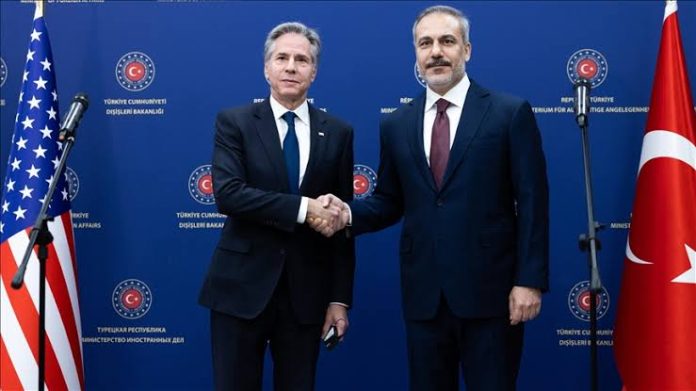Facebook Twitter (X) Instagram Somali Magazine - People's Magazine
Türkiye and the United States have reiterated their shared commitment to ensuring stability in Syria and preventing terrorist groups like Daesh and the PKK from exploiting the volatile situation in the region. This was emphasized during a meeting between Turkish Foreign Minister Hakan Fidan and U.S. Secretary of State Antony Blinken in Ankara.
Stability and Counter-Terrorism in Post-Assad Syria
Speaking on Syria’s future after Bashar al-Assad’s ouster, Foreign Minister Fidan stressed Türkiye’s priorities, which include curbing terrorism and securing stability. “Our primary focus is preventing Daesh and PKK from gaining ground and ensuring a stable Syria as quickly as possible,” Fidan said.
Secretary Blinken echoed these sentiments, highlighting the necessity of inclusive governance in Syria. “We want a future for Syria that is non-sectarian, protects minority rights, and poses no threat to neighboring countries,” Blinken noted.
Both leaders discussed strategies for a post-Assad government, with Blinken emphasizing the importance of continued U.S.-Turkish collaboration to prevent Daesh’s resurgence and stabilize the region.
Debate Over the Role of PKK/YPG
The PKK and its Syrian affiliate, the YPG, remain a contentious issue between the NATO allies. Türkiye considers these groups terrorist organizations that threaten its national security, while the U.S. views the YPG as a key ally in combating Daesh.
President Recep Tayyip Erdoğan underscored Türkiye’s intent to prevent the PKK/YPG from exploiting the power vacuum in Syria. “We will not allow any terrorist corridor along our borders,” Erdoğan said, adding that Ankara would maintain its stance on countering Daesh as well.
Focus on Gaza Ceasefire
The Gaza conflict was also a topic of discussion, with Blinken expressing optimism about the possibility of a ceasefire. He urged Türkiye to use its influence to encourage Hamas to accept peace efforts. “We’ve seen encouraging signs toward a ceasefire. Türkiye’s role in this is crucial,” Blinken remarked.
However, Türkiye’s relationship with Hamas complicates its role as a mediator. While Western nations classify Hamas as a terrorist organization, Türkiye maintains ties with the group, viewing it as a liberation movement.
Addressing Broader Geopolitical Concerns
The meeting also highlighted broader regional implications, including the risk of a security vacuum in Syria exacerbating existing tensions. Both nations agreed on the importance of maintaining a military presence in eastern Syria to counter Daesh. Currently, the U.S. has around 900 troops stationed in the region.
The Biden administration is particularly concerned about the destabilizing potential of a weakened Syria, while Türkiye focuses on securing its borders from terrorist threats.
Shared Goals Amid Divergences
Despite differing approaches to some issues, Blinken and Fidan emphasized shared goals. “We have broad agreement on the way forward,” Blinken said, adding that efforts would prioritize an inclusive interim government in Syria that safeguards the rights of all communities.
The discussion underscores the complex interplay of regional and international interests in shaping Syria’s future. Both Türkiye and the U.S. face the challenge of balancing counter-terrorism efforts with broader political and humanitarian goals.
This collaboration between Ankara and Washington demonstrates the ongoing effort to address the multifaceted challenges in Syria, a region at the crossroads of geopolitical, humanitarian, and security concerns.

